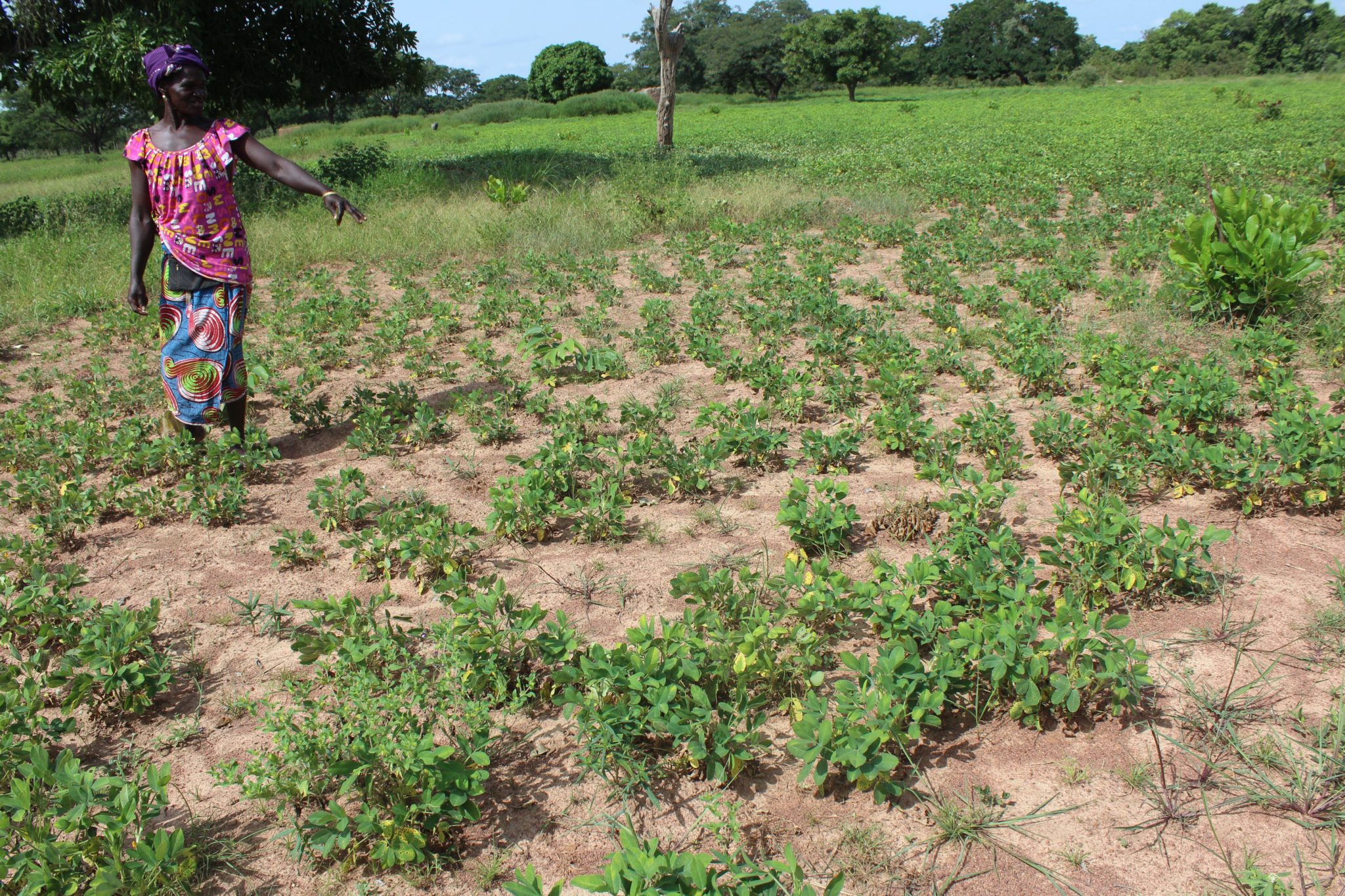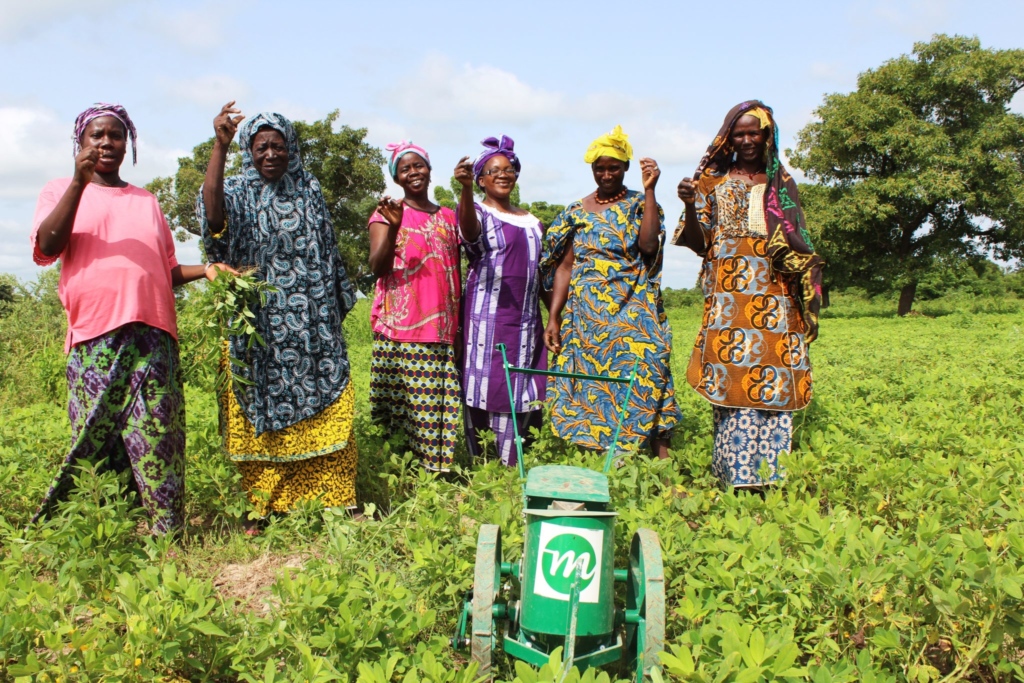
Farmer Nassoun points to the gaps in her field that she planted without myAgro.
Nassoun Kone shields her eyes from the blinding rays of the sun as she walks on hard, cracked soil to get to her peanut field. The only sound is the occasional crunch of a leaf beneath her feet; no insects hum and no cows bellow on this dry afternoon. Overhead, a single wispy cloud in the blue sky confirms what Nassoun suspected:
“Once again, no rain today,” she says with a sigh.
When she reaches her field, Nassoun points out the large gaps between her peanut plants.
“We’ve had no rain for fifteen days.”
Despite the poor rainfall, Nassoun has hope for her peanut harvest when she glances at the section of her field she planted with myAgro. The leaves are green and there are no gaps between plants. This section of her field could save her harvest.
If Nassoun were to have a poor harvest due to the lack of rainfall, her family, who depend on her for their food, would suffer as a result. And she is not the only farmer in this dire situation. Smallholder farmers everywhere, who rely on the food they grow to feed their families, are at a high risk of food insecurity due to crop loss from drought, floods, soil erosion, and infestations. Though climate change is prevalent on the planet, the West Africa Sahel is considered one of the world’s most vulnerable regions, as temperature increases are projected to be 1.5 times higher than in the rest of the world. By 2080, temperature increases higher than 2°C are projected to decrease yields of millet and sorghum, staple crops in the region, by 15–25 percent.
Women farmers are particularly at a disadvantage when the effects of climate change strike. According to the FAO, women produce up to 80% of the food grown in sub-Saharan Africa and over 50% of food globally. Despite that they are the backbone of the agricultural community, women are excluded from most government agricultural programs, which are focused on crops grown by men.
In Mali and Senegal, men have control over the use of household productive resources, such as donkey carts and labor. As a result, women’s fields are planted last. This is problematic because farmers need to plant on time after the first rains in order to reap the most from their harvests. If they miss the first rains, a dry spell could severely delay their planting and lead to crop failure. Since climate change is making it increasingly difficult to predict the rains, it is especially important that farmers plant on time.
Recognizing the threat of climate change particularly for women farmers, myAgro designed its program to empower women to invest in themselves and grow more food for their families. myAgro’s model provides women access to agricultural input markets that didn’t previously exist, delivering high quality seed and fertilizer on time so farmers can plant early and have larger harvests. myAgro also supports “healthy farms” by encouraging a smart rotation of crops to improve soil health and offering crops that are resistant to high heat and rain shortages.
“In our technical agricultural trainings, we emphasize to farmers the importance of crop rotation,” explains Dido, myAgro’s Senior Agricultural Associate in Senegal. “It is important for farmers to rotate their crops to avoid pests attacking the same crop every year. Crop rotation is also vital for soil health. For example, some crops take more nitrogen than others, and if you plant that same crop year after year, your soil will be depleted of nitrogen. We tell this to farmers, in addition to offering crops like sorghum and a certain variety of maize that require less water and can therefore withstand droughts. Sorghum is especially valued because of its high nutritional content. These methods combined really help us to mitigate the risk of climate change for our farmers.”
Another way myAgro mitigates the climate risks for farmers, particularly women, is by offering them the option to pay for or rent a myAgro precision planter: a tool that automatically plants seeds at uniform, measured distances while micro-dosing the ideal amount of fertilizer to maximize plant growth. With access to this high-tech farming tool, not only can women plant their fields on time, but they can plant more quickly while using best-practice micro-dosing techniques that double their yields. This leaves them more time and energy for other priorities, like growing their small businesses and educating their children. With larger harvests, women combat the problems of malnutrition and food insecurity that are exacerbated by climate change.
“With the myAgro precision planter, I’ve increased my land planted to ¼ hectare of sorghum,” says Kadia Kone, myAgro farmer in Mali, “Now that I have larger harvests, I can prioritize the health of my family.”

Kadia Kone (second from left) stands proudly with the other women in her village and her myAgro precision planter
myAgro’s North Star is to help 1 million small-scale farmers to increase their income by $1.50 per day by 2025 to move out of poverty. myAgro is a nonprofit social enterprise that enables smallholder farmers to use their mobile phones to pay on layaway for high quality inputs (seeds, fertilizer) and agricultural training. These investments allow farmers to grow 50 – 100% more food each season and to increase their income.